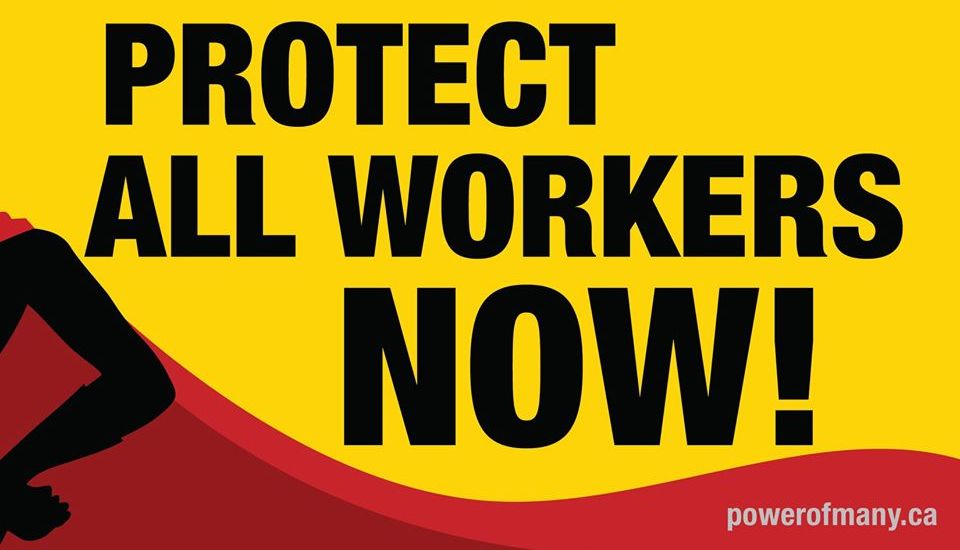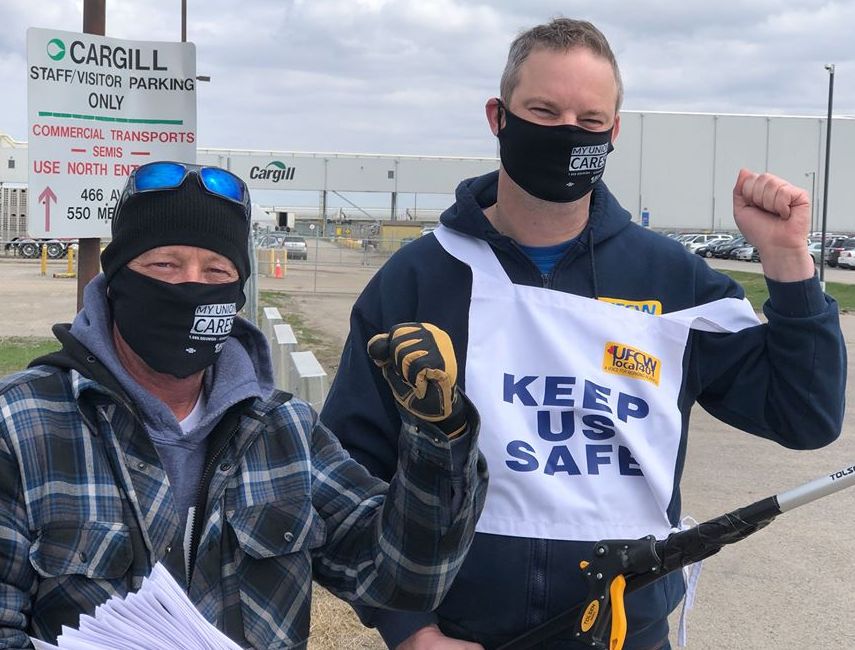|
February 19, 2021 - No. 8
Workers' Key Role in Curbing the
Spread of COVID-19
Meat Packing Workers Achieve
Closure of Unsafe Olymel Plant
- Peggy Morton -
 
• The COVID-19 Pandemic
and North American Meat Packing Plants
Firm
Opposition to Rule by Decree
• Quebec
Workers' Demands for Solutions to the
Crisis in Health Care
The
Fight for Job Security During the Pandemic
• Hotel Workers in
Vancouver Are Not Backing Down in Their Fight
for
Their Jobs
Workers' Key Role in Curbing the
Spread of COVID-19
- Peggy Morton -
 
Olymel abruptly announced on February 15 that
its pork processing plant in Red Deer, Alberta would close
for an indefinite shutdown, ten days after the
union informed Olymel that the workers
overwhelmingly declared in a survey that they
considered the plant was unsafe and should
be closed. During these 10 days the number of
active cases in the plant more than
doubled.
Olymel has not responded to the demand
presented by United Food and Commercial Workers
Local 401 for full compensation for all the
workers. Instead it says it will "help" the
workers access available resources. This is
unacceptable.
The serious outbreak at Olymel began around
January 20 and a young worker, Darwin Doloque,
tragically died on January 28. Alberta Health
confirmed 192 active cases,
and 326 total confirmed cases linked to the plant, as of February 15.
The Mayor of Red Deer expressed her grave
concern as COVID-19 cases rose in the city but
the company did not heed this either. Alberta
Health Services (AHS) stated on February 8,
"Olymel has robust processes in place to limit
the spread of illness within their facility and
has strict protocols in place regarding physical
distancing, PPE, disinfection and other safety
measures to support physical distancing of
staff." Three days later AHS wrote a
confidential letter to Olymel stating that
testing revealed that one in five workers were
likely positive for COVID-19. Olymel announced
the shutdown soon after the letter became
public.
 Had AHS spoken to
the workers, it would have confirmed that their
concerns were based on the actual situation and
required immediate action. Workers said the
cafeteria, where workers must remove their masks
in order to eat, was very congested. Why is it
that restaurants are shuttered or required to
implement social distancing but this does not
apply to workplaces? Workers also explained that
they were sent back to work after testing, only
to be informed later of a positive test. And as
the union pointed out, the PPE and Plexiglass is
not enough once a serious outbreak is raging in
a plant where 1,850 workers work in close
proximity. Had AHS spoken to
the workers, it would have confirmed that their
concerns were based on the actual situation and
required immediate action. Workers said the
cafeteria, where workers must remove their masks
in order to eat, was very congested. Why is it
that restaurants are shuttered or required to
implement social distancing but this does not
apply to workplaces? Workers also explained that
they were sent back to work after testing, only
to be informed later of a positive test. And as
the union pointed out, the PPE and Plexiglass is
not enough once a serious outbreak is raging in
a plant where 1,850 workers work in close
proximity.
Both AHS and the Chief Medical Officer of
Health (CMOH) have brought their offices into
disrepute by blaming the workers instead of
taking up their social responsibility. The CMOH
suggested it was some "off-site activities" that
were responsible for the growing number of
cases, while AHS encouraged Olymel to threaten
workers with fines, discipline and possible
termination for any infractions of public health
requirements.
The situation at Olymel confirms that it is the
collective actions of the workers speaking out
in their own name and demanding that their
rights to a safe workplace and to refuse unsafe
work be upheld that are decisive. The state
agencies like AHS and Occupational Health and
Safety have become captive to the
global oligarchs and their interests and drive
for maximum profit. It is the workers who are
standing up to protect their collectives, their
families and their community and they must have
the final say in what constitutes safe work, and
to exercise this right without loss of pay or
livelihood.

The outbreak of COVID-19 in the Olymel Red
Deer plant which has now resulted in the indefinite closure of the plant is once again
putting the spotlight on the conditions of
workers in meat processing plants, who have been
particularly hard hit by COVID-19 across North
America. Neo-liberal globalization has imposed
inhuman conditions in the industry despite
militant resistance of the workers. These
include breakneck line speeds, a big contributor
to the high rate of workplace injuries and
illnesses, low pay, threats, intimidation and
bullying, including the pressure to work sick
even under COVID-19. The "help wanted" sign
never goes down outside these plants and on the
Canada Job Bank, reflecting the difficulties in
recruiting and keeping workers. The meat packing
giants rely heavily on the most vulnerable
workers including refugees, undocumented workers
in the U.S. and workers recruited through the Temporary Foreign Worker Program in Canada.
According to data collected by the Food and
Environment Reporting Network in the U.S.,[1] as of
February 12, at least 1,389 meat packing and food
processing plants (569 meat packing and 820 food
processing) and 387 farms and production
facilities have had confirmed cases of COVID-19.
At least 87,237 workers (57,332 meat packing
workers, 17,114 food processing workers, and
12,791 farmworkers) have tested positive for
COVID-19 and at least 374 workers (283 meat packing workers, 48 food processing workers,
and 43 farmworkers) have died.
 Former U.S.
President Trump ordered U.S. meat packing plants
to remain open on April 28, 2020. The U.S.
Department of Labor imposed only two fines for
failure to protect workers. JBS, the largest
meat packer in the U.S., was fined $15,615 after
300 workers were infected and six died at its
Greeley, Colorado plant. JBS racked up more than
$1.6 million in profits from April to December
2020. Smithfield, the largest pork producer in
the world, was fined $13,949 after 1,294 workers
were infected and four workers died at its Sioux
Falls, South Dakota plant. The president of the
union representing the workers called the fines
"an incentive to make these workers work faster
and harder in the most unsafe working conditions
imaginable." Former U.S.
President Trump ordered U.S. meat packing plants
to remain open on April 28, 2020. The U.S.
Department of Labor imposed only two fines for
failure to protect workers. JBS, the largest
meat packer in the U.S., was fined $15,615 after
300 workers were infected and six died at its
Greeley, Colorado plant. JBS racked up more than
$1.6 million in profits from April to December
2020. Smithfield, the largest pork producer in
the world, was fined $13,949 after 1,294 workers
were infected and four workers died at its Sioux
Falls, South Dakota plant. The president of the
union representing the workers called the fines
"an incentive to make these workers work faster
and harder in the most unsafe working conditions
imaginable."
In Canada not a single fine has been levied and
the global oligarchs continue to operate with
impunity. In addition to the outbreak at Olymel,
there are currently eight additional outbreaks,
defined as five or more cases, in meat and
poultry processing plants in Alberta.[2]
The
actions of workers and their families at Cargill have resulted in
the RCMP opening an investigation into the deaths at Cargill's High
River plant in 2020, and a class action suit is being prepared. The
support of the authorities for the global oligarchs who consider
endangering the lives of workers for their private benefit a "normal
business practice" shows the extent to which the public authority has
been destroyed. Workers who are fighting to hold the wealthy owners, as
well as the authorities who serve them, to account are defending their
rights and the interests of society as well. Notes
1. U.S. Food and
Environment Reporting Network
2. Outbreaks have been
reported by Alberta Health at Cargill Foods
High River, Cargill Case Ready Calgary, Lilydale
poultry plants in Calgary and Edmonton, Harmony
Beef in Balzac, Sofina Foods in Edmonton and
Calgary, and Maple Leaf Poultry in Edmonton.

Firm Opposition to Rule by
Decree
 
While health care workers in Quebec are insisting their demands be met
to deal with the health care crisis which is aggravated in the
conditions of the COVID-19 pandemic, government executives are
attempting to strengthen rule by decree to deprive workers of any say
over their working conditions and the direction of their sector and of
the economy. This is part of the state restructuring that has been
going on for over 30 years and is being intensified, using the pandemic
as a pretext, to impose the will of narrow private interests.
Already, health and social service
workers are subject to ministerial orders that
give the government and employers the power to
declare their existing collective agreements
null and void and to unilaterally change working
conditions, under the pretext of facing the
public health emergency. These orders have been
used many times since they were issued in March
2020 and they have created havoc in workers' lives, leading to resignations and workers
becoming sick and unable to work because of
their untenable conditions.
At this time, the close to 550,000 Quebec
public sector workers are trying to renew their
collective agreements. This includes about
260,000 workers in health and social services.
All collective agreements in the public sector
expired on March 31, 2020. Negotiations began a
year and a half ago and only one tentative
agreement has been reached so far.
Health
care workers report that the Quebec government is demanding that unions
agree that instead of having negotiated and enforceable working
conditions that allow workers to do their jobs safely and in a manner
that permits them to provide quality care, they should endorse some
"recommendations" to be made to the Ministry of Health and Social
Services, which will then issue ministerial directives over which
workers and their unions have no control.
 An
example is the effort of the Quebec Health Federation (FSQ-CSQ) to
renew the collective agreements of its members. The FSQ-CSQ represents
5,000 nurses, licensed practical nurses and respiratory therapists in
the Montreal, Laval, Gaspésie and Northeastern Quebec regions.
Among the issues that government negotiators propose be handled through
ministerial directives are staff-to-patient ratios and private hiring
agencies, two of the main issues of concern for workers in the sector.
Important issues on which workers are fighting to assert their needs
and their rights are to be declared out of their reach. An
example is the effort of the Quebec Health Federation (FSQ-CSQ) to
renew the collective agreements of its members. The FSQ-CSQ represents
5,000 nurses, licensed practical nurses and respiratory therapists in
the Montreal, Laval, Gaspésie and Northeastern Quebec regions.
Among the issues that government negotiators propose be handled through
ministerial directives are staff-to-patient ratios and private hiring
agencies, two of the main issues of concern for workers in the sector.
Important issues on which workers are fighting to assert their needs
and their rights are to be declared out of their reach.
The
government's January 21 comprehensive settlement offer was unanimously
rejected by FSQ-CSQ's Federal Council on February 7. The council is
comprised of delegates from all member unions.
One of the main reasons for the rejection of
the offer is the firm opposition to rule by
decree and the demand that the Quebec government
must meet the demands set by workers to
immediately improve working conditions and the
delivery of services, which will contribute
to alleviating the crisis.
Among such demands are the immediate
improvement of wages, which have been either
frozen or barely maintained at cost of living
adjustments for over 15 years, making it
impossible to retain and attract workers in the
sector; the elimination of mandatory overtime
which is rampant and creating chaos in the lives
of workers, wrecking their health and family
life and the services they provide; the general
improvement of working conditions with a humane
work load, stable teams and stable schedules;
the establishment of staff-to-patient ratios which
enable workers to provide quality service to the
people; the reduction of the use of private
hiring agencies which are extremely costly to
the public health care system and the investment
of those monies in the public system to improve
the conditions in line with the demands of
the workers. Workers
are expressing the strong conviction that their decisive say in
the determination of working conditions is key to humanizing their
conditions and the delivery of the services. They have waged
several mass actions to oppose the ministerial orders and government
dictate in negotiations and are determined to have their demands
met.

The Fight for Job Security
During the Pandemic

There are new developments in the battle of
workers in several Vancouver hotels to ensure
that as hotels reopen, workers laid off due to
the pandemic-related shutdowns retain their
jobs. Unite Here Local 40 announced on January
20 that a class action lawsuit had been filed
against the Pan Pacific Vancouver on behalf of
workers wrongfully terminated during the
COVID-19 pandemic. The case was filed by a
worker who had worked at the hotel for 24 years
until he was terminated, along with dozens of
other workers, in August 2020. At the time of filing
the workers at the Pan Pacific
were not unionized but throughout their fight
have had the support of unionized workers in
other Vancouver hotels, most represented by
Unite Here Local 40. The Pan Pacific is a
high-end hotel in the Vancouver Convention
Centre East owned by an affiliate of Westmont
Hospitality Group. Westmont is one of the
world's largest privately held hospitality
companies.
 In
a January 20 press release, Unite Here Local 40 spokesperson
Michelle Travis said, "Early in the pandemic, hotel management
concocted a plan to drastically reduce its staff from 450 workers to 80
and dismiss the rest. Instead of informing workers of their plans, the
company sent workers repeated messages delivering false hope suggesting
they intended to bring workers back. Pan Pacific began terminating
staff in batches, without cause or advance notice. The suit alleges
that the hotel did this to avoid group termination provisions in the
Employment Standards Act that requires advance notice and would trigger
larger payouts to workers. Between firings, the hotel offered workers
$250 to sign a contract taking away their regular full-time status to
become casual, on-call workers and waive their severance rights. Those
who refused to sign were among those fired." In
a January 20 press release, Unite Here Local 40 spokesperson
Michelle Travis said, "Early in the pandemic, hotel management
concocted a plan to drastically reduce its staff from 450 workers to 80
and dismiss the rest. Instead of informing workers of their plans, the
company sent workers repeated messages delivering false hope suggesting
they intended to bring workers back. Pan Pacific began terminating
staff in batches, without cause or advance notice. The suit alleges
that the hotel did this to avoid group termination provisions in the
Employment Standards Act that requires advance notice and would trigger
larger payouts to workers. Between firings, the hotel offered workers
$250 to sign a contract taking away their regular full-time status to
become casual, on-call workers and waive their severance rights. Those
who refused to sign were among those fired."
Many of the workers are immigrants and women
with families who have worked at the hotel for
20 to 30 years or more. The union estimates
that the workers could be owed as much as $3
million if the lawsuit succeeds.
Hotel workers and other workers in the
hospitality sector, in bars, restaurants and
businesses providing services to tourists, have
been demanding throughout the disruption caused
by the pandemic, that employers and governments,
both provincial and federal, ensure that their
jobs are there for them to return to as things
reopen. This court action is part of that
ongoing fight.
On February 11 Unite Here reported that the Pan
Pacific workers had voted in favour of joining
the union.

(To access articles
individually click on the black headline.)
PDF
PREVIOUS ISSUES
| HOME
Website: www.cpcml.ca
Email: office@cpcml.ca
|

